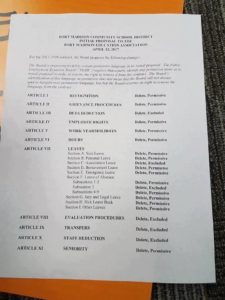Andrew Isaacson provides another look at teacher contract negotiations under Iowa’s new collective bargaining law. See also Randy Richardson’s recent commentary. -promoted by desmoinesdem
On February 17th, 2017, Iowa’s 43-year-old collective bargaining law was gutted by the Republican-controlled legislature. The new law has created deep confusion and uncertainty for over 180,000 public sector workers. In Iowa’s public schools, this confusion affects union and non-union employees, administrators, students and the communities that are served by our schools.
I am a field representative for the Iowa State Education Association, the union representing professional educators in nearly every local school district across the state. My work is focused in 17 locals where I concentrate on assisting members with professional issues that may arise. I have heard two requests from those around me. Does the administration truly understand the impact of the new law, and what do we do next? I am going to address both.
To the administration:
The new law defines what are mandatory, permissive, and excluded topics of bargaining. It does not say “You now must take everything out of the contract.”
When I say everything, I am talking about all permissive topics of bargaining. If a topic is permissive, that means that it can be mutually discussed – if both parties agree – as a part of a contract. It does not mean that it should be moved to a “handbook.” Removing grievance procedures, hours, leave, seniority, vacations and holidays, overtime, and job classifications causes unrest and unease with employees, who know that these topics of bargaining do not have as much strength in a handbook versus a negotiated Master Agreement.
Realize that when language is removed from a contract, students’ needs are put at-risk. By taking away health and safety language which contractually obligates an employer to provide a safe working environment or by taking away class size language which obligates employers from having overcrowded classrooms, administrative control is placed above the needs of student learning.
It cannot be had both ways. Removing all permissive topics of bargaining in entirety from a contract harms a school system, employees, and students. Placing it in a “handbook” is not the same thing. Educators cannot be supported while taking away what has been negotiated in good faith for the past 40 years.
If administrators are being told by anti-public education lawmakers, lobbyists, and lawyers that everything must be taken out of a contract, it is misleading. In fact, administrators, by law, can still keep many items in the contract. If educators and administrators worked peacefully, students thrived, and the school was succeeding, then there is no logical reason to reduce a contract to only a “base wage.”
If administrators are saying that they need their employees to trust them – the administrator needs to be mindful that employee’s professional lives are at stake. The administrator needs to remember that they are talking about an employee’s health care and their family’s health care and whether or not they still have jobs. When an administrator says he or she wants their employees to trust them, trust is earned, so please make sure that your actions are true to your words.
There are many school officials and administrators that are believed when they say that the goal is not to hurt teachers, communities, and students. However, if the Master Contract is reduced to a base wage that is what will happen. The community will be alienated and students will be hurt. Just because something can be done does not mean that it should be done.
You have an opportunity to change your perspective. Stand with public education. Stand with your teachers, your students, and your community.
To all supporters of public education:
If a school district is stating that “Things will be okay and we have the best interest of everyone in mind,” but they are still trying to gut a negotiated agreement, then they are either being misled by an outside source or they are lying. If the destruction of a contract is agreed to, then the education profession will be hurt, students will not be served, and communities will suffer.
Stand against this. Stand with each other. Do not let outside influences hurt you.
Don’t be fooled by someone saying that bad working conditions must be agreed to. No one should ever agree to have good working conditions taken away. It is time to stand up for our values as employees and educators. Stand with others who value public education. Stand with our students and our communities. Speak out against the attacks on our profession and public education. Call local school representatives. Go to the school board meetings and make our voice heard. Stand with others at the school board meetings. If your district representatives want to gut negotiated agreements, it will not be tolerated and it will not be done comfortably.
We all want to look back in two years knowing that we did everything that we could to protect what we value. We do not want to wish that we could have done more.
Stand strong.
Initial contract proposal from the Fort Madison Community School District to the teachers union (click to enlarge):




5 Comments
Another question
My school district is said to be negotiating a new contract now, but the union local has also said they have not re-certified yet. How can this be? How can we find out what union locals have won re-certification elections?
iowavoter Thu 27 Apr 9:26 AM
great question
I don’t think any of the unions have conducted re-certification elections yet. My understanding was that the details of that process are still being worked out. I will try to get further information.
desmoinesdem Thu 27 Apr 9:51 AM
knowledgeable people
tell me that under the new Iowa law, re-certification isn’t required until next year’s contract negotiations.
desmoinesdem Thu 27 Apr 10:05 PM
Thank you.
for looking into it.
iowavoter Fri 28 Apr 5:20 PM
Please give voters good clear information
Like many Iowa voters, I don’t have children in the school system and I know very little about how school collective bargaining works. But I want to vote the right way to help teachers and kids. Yes, I need and will appreciate spoon-fed information in the future. Provide it and I’ll vote accordingly.
PrairieFan Thu 27 Apr 1:34 PM